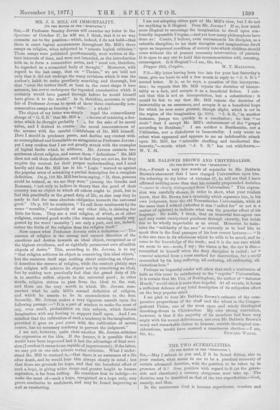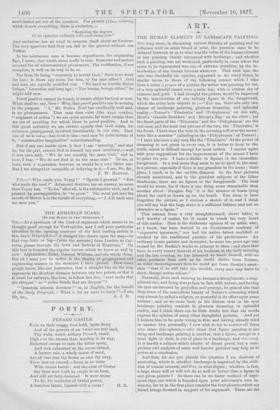THE TWO SUPERFLUITIES.
(TO THE EDITOR OF THR .,EITOTATOR:1 Sin,—May I submit to you and, if it be found fitting, also to your readers, what seems to me to be a practical summary of certain advanced doctrine, with the position to be taken up in presence of it ? Some position with regard to it (at the grave- side and elsewhere) a country clergyman must take up. The doctrine may be described as that of the two superfluities,—God, namely, and Man.
In the macrocosm God is become superfluous, creation and annihilation are out of the question. For growth (cNagi-,natura), which is now everything, there is evolution,— " Repairing the degrees Of its egree,ion endlessly with over-rising now."
And evolution has no need to concern itself about an Evolver. The very sparrows find they can fall to the ground without our Father.
In the microcosm man is become superfluous, the originating Ego, I mean, that which alone really is man. Sensoriesand motors account for all microcosmical phenomena. The verification, if not complete, is well on its way to be so.
Far from its being "necessary to invent God," there is no work for him ; is there any room for him, or for man either ? God and man are equally crowded out. "No need to trouble divine beings," Lucretius said long ago ; "Nor human beings either," he might add now.
Proof positive cannot be found, it seems, either for God or man. What shall we say, then ? Why, that proof positive can be nothing to the purpose. " I," Mr. Roden Noel has excellently well said, is no phenomenon. That man does exist (the sipxo! wpgesir, " originant of action") we are quite certain, far more certain than we are of anything for which there is proof positive. And in this great certainty we are certain equally that God exists, his existence presupposed, involved inextricably, in our own. Each one of us is fAxeg—has God in him—and may be quite certain of it, " constructive imagination" notwithstanding.
But if any one insists upon it that I am "intueing," and that he, for his part, cannot find in himself any such intuitions,—well it was once said, " We do not worship the same God," and so now, I fear, " We do not find in us the same man." To me, at least, such a separation between us would be a very bitter one. But I am altogether incapable of believing in it.—I am, Sir, &e,, F. W. HARPER.
P.S.—" Who made you, Topsy?" "'Speets I growed." "But who made the seed ?" Advanced doctrine has no answer, no more than Topsy has. " To be," after all, is the substantive verb, and is present by presupposition, in "to grow." The word put into the mouth of Moses is in the mouth of everything,—" I AM bath sent me unto you."







































 Previous page
Previous page